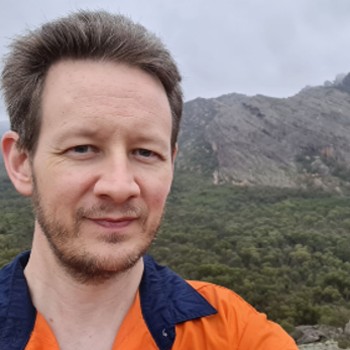During Nation Science Week 2024, we are shining the spotlight on four people who use science skills every day in their roles working for Resources Victoria. Meet Dr Mark McLean, Team Leader Geophysics and Geological Modelling.
Dr Mark McLean - Team Leader Geophysics and Geological Modelling
 Tell us about your role
Tell us about your role
I am a geoscientist with the Geological Survey of Victoria (GSV), where I lead a team responsible for acquiring, managing and interpreting the state's geophysical datasets and for building complex 3D geological models of Victoria's rocks. The best part of my role is uncovering Victoria's geology and tackling the challenges of understanding how it has evolved over time.
I also have a part-time role lecturing at The University of Melbourne where I collaborate with astronomers researching an exciting new technique called 'muon tomography'. This is a revolutionary development in geophysics that uses particles from space to image geology. I also teach Applied Geophysics and supervise postgraduate students. It's a rewarding role, particularly when I witness the moment a student grasps a concept and develops the same enthusiasm for geophysics and geology that I have.
How did you get into your career?
I have always loved learning about the Earth, which inspired me to study geology in high school. This passion led me to pursue a BA/BSc and an MSc at Monash University, followed by a PhD at The University of Melbourne. My PhD involved acquiring an airborne geophysical survey in East Antarctica and building 3D geological models of the geology beneath several kilometres of ice. The 3D modelling experience I acquired was well-aligned to the requirements at the Geological Survey of Victoria. I have been building models of rocks ever since.
What benefits does your role bring to the state?
Geophysics has a (not so secret) super-power – which is to 'see through' the overlying cover rocks and soil profile to understand the geology beneath. This is crucial because we've already discovered all the 'easy to find' earth resources - they were sticking out of the ground! The challenge today is to find resources that are completely buried. To achieve this, we use geophysics, 3D modelling and several other techniques to image the Earth's structure. The more we learn about Victoria's geology, the more we can predict where Victoria's Earth resources are likely to be hidden. Making this knowledge available to explorers not only boosts the state's economy but also helps us find the critical minerals needed for a net-zero future.
What advice would you have for those interested in a science-based career?
My advice for anyone interested in science is to let your passion drive you to analyse the data and seek answers. The best scientists excel because they are passionate about what they do and love the puzzles science presents. If this resonates with you, let your curiosity lead you to question everything and 'uncover every stone' (pun unintended). Importantly, expect your research to face setbacks (because it probably will), but stay motivated and keep pushing forward.






